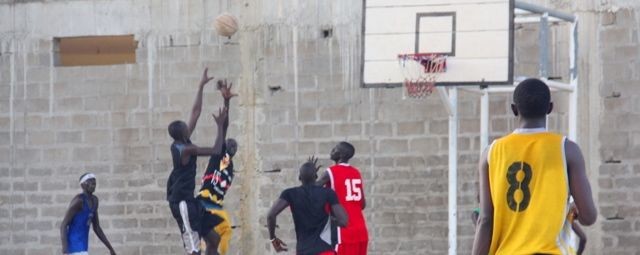As the world’s newest nation, South Sudan is yet to join the International Basketball Federation, but it boasts a growing pool of sporting talent nonetheless, according to interviews with coaches and players in the Juba, the national capital.
Many of its players come from the diaspora community, having returned from countries all over the world where some lived as refugees during the second Sudanese civil war.
South Sudan’s national team has already competed in various competitions across East Africa where their reputation for talented players precedes them, claims coach Longar Maror Reech.
“We really have good players and if we were given the freedom as coach to select players… who will represent us in matches, it will bring good results,” he adds.
Within the country’s capital, Juba, nine teams currently compete, supported by a variety of private sector companies or volunteer coaches. However, a lack of reliable support or access to individual courts means that only four of these – Citizen, Black Star Malakia, Munuki and Gudele – are fully active in practicing and competitions, according to Reech.
Players and coaches alike who spoke to Radio Tamazuj talked of the positive impact that the sport’s growth is having on young South Sudanese men and women. Karbine Jam Ngor, who has coached Young Star team for girls aged 13 to 16 for two years, explained that basketball inspires South Sudan’s younger generations.
James Tongun, a player with Black Star Malakia, reiterated the growing popularity of the sport. “We started playing basketball in 2009…We have very many people wanting to join basketball but no support.” The main challenges, he claims, are too few organized competitions and not enough courts on which to practice.
Mike Michael explained how most teams work: “Like me: I am with Bilpam Warrior team, but right now am not doing my training with my team and each of us comes from different countries with different levels. I just meet with my team in the case of a match, then we all (multiple teams) train in one court.”
Jam too believes that more support is needed to increase access to the game and the quality of training players receive.
“For me I can talk on the side of these young kids, I have two years with them and if they don’t have shoes, I buy for them. We were supported once by the vice president but since that time no other support came to us,” he added.
Jam began his career coaching basketball as a refugee in Kenya’s Kakuma refugee camp in the early 1990s and his dedication to the sport and its future within his country is evident.
“We are just volunteering as our service to the people. Others think that the Ministry of Sport is paying us money for the job we are doing, but no.”
His commitment is not unusual: each team is responsible for sourcing its own funding in a country where representing one’s nation is more likely to mean fighting in its army, the SPLA. The Director General of Sport within the Ministry, Edward Settimo, told Radio Tamazuj that they are unable to support any one team because the government has limited resources for the project.
“We as the ministry cannot support a single team, but we can support a national team… You know we have limited resources and these clubs should lobby for support from companies and other different institutions,” Settimo added.
In spite of the need for greater funding and support for the sport, these young men and women believe that South Sudan has a bright future in basketball.
Winnie Alhaj and Susan Awal Samuel, two of South Sudan’s rising female players, encourage their female teammates not to be intimidated by playing alongside men and take up the sport in order to realize their dreams.
“We have the talent in South Sudan but need the direction.”
Photo (above): Players at a traiing match at Juba One Court
Gallery 1: Coach Longar Maror running a training session
Gallery 2: A 15-year old girl playing for the Young Star team takes a practice shot
Gallery 3: Susan Awal Samuel speaks about what basketball means to her
Gallery 4: Young Star coach Coach Karbine Jam Ngor
Gallery 5: Player Lual Deng watches a practice match
Gallery 6: Susan Awal makes a pass during a match at Juba One court
Gallery 7: Coach Longar Maror Reech
Gallery 8-11: Drills at Nimra Talata court




